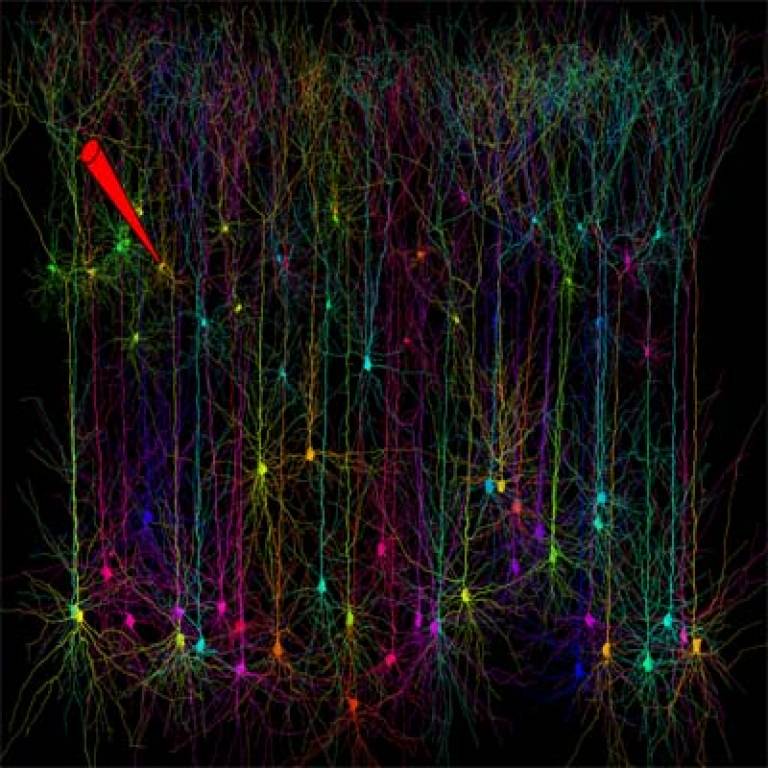A butterfly effect in the brain
30 June 2010
Links:
 nature.com/nature/index.html" target="_blank">Nature
nature.com/nature/index.html" target="_blank">Nature
Press release
Next time your brain plays tricks on you, you have an excuse: according to new research by UCL scientists published today in the journal Nature, the brain is intrinsically unreliable.
This may not seem surprising to most of us, but it has puzzled neuroscientists for decades. Given that the brain is the most powerful computing device known, how can it perform so well even though the behaviour of its circuits is variable?
A long-standing hypothesis is that the brain's circuitry actually is reliable - and the apparently high variability is because your brain is engaged in many tasks simultaneously, which affect each other.
It is this hypothesis that the researchers at UCL tested directly. The team - a collaboration between experimentalists at the Wolfson Institute for Biomedical Research and a theorist, Peter Latham, at the Gatsby Computational Neuroscience Unit - took inspiration from the celebrated butterfly effect - the idea that the flap of a butterfly's wings in Brazil could set off a tornado in Texas. Their strategy was to introduce a small perturbation into the brain, the neural equivalent of butterfly wings, and ask what would happen to the activity in the circuit. Would the perturbation grow and have a knock-on effect, thus affecting the rest of the brain, or immediately die out?
It turned out to have a huge knock-on effect. The perturbation was a single extra 'spike', or nerve impulse, introduced to a single neuron in the brain of a rat. That single extra spike caused about thirty new extra spikes in nearby neurons in the brain, most of which caused another thirty extra spikes, and so on. This may not seem like much, given that the brain produces millions of spikes every second. However, the researchers estimated that eventually, that one extra spike affected millions of neurons in the brain.
"This result indicates that the variability we see in the brain may actually be due to noise, and represents a fundamental feature of normal brain function," said lead author Dr. Mickey London, of the Wolfson Institute for Biomedical Research, UCL.
This rapid amplification of spikes means that the brain is extremely 'noisy' - much, much noisier than computers. Nevertheless, the brain can perform very complicated tasks with enormous speed and accuracy, far faster and more accurately than the most powerful computer ever built (and likely to be built in the foreseeable future). The UCL researchers suggest that for the brain to perform so well in the face of high levels of noise, it must be using a strategy called a rate code. In a rate code, neurons consider the activity of an ensemble of many neurons, and ignore the individual variability, or noise, produced by each of them.
So now we know that the brain is truly noisy, but we still don't know why. The UCL researchers suggest that one possibility is that it's the price the brain pays for high connectivity among neurons (each neuron connects to about 10,000 others, resulting in over 8 million kilometres of wiring in the human brain). Presumably, that high connectivity is at least in part responsible for the brain's computational power. However, as the research shows, the higher the connectivity, the noisier the brain. Therefore, while noise may not be a useful feature, it is at least a by-product of a useful feature.
Media contact: Ruth Howells
Image: A schematic diagram showing the experimental approach, where a patch-clamp electrode is used to make a recording from a single pyramidal neuron.
UCL context
UCL Neuroscience brings together all UCL neuroscientists to unravel the mysteries of the nervous system. They work across seven major themes to make fundamental discoveries about brain function and behaviour, to teach and train the next generation of scientists and clinicians, and to transform our ability to diagnose and treat neurological and psychiatric disease.
 Close
Close

